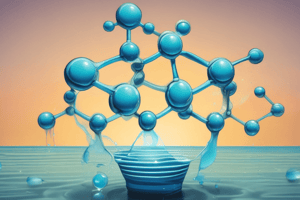Podcast
Questions and Answers
What is the most important characteristic of water that dictates many of its behaviors?
What is the most important characteristic of water that dictates many of its behaviors?
Polarity
What results in the polarity of the water molecule?
What results in the polarity of the water molecule?
- Circular shape
- Even electron distribution
- Uneven electron distribution (correct)
- Linear shape
Water's polarity allows it to dissolve only non-polar substances.
Water's polarity allows it to dissolve only non-polar substances.
False (B)
What is the force that results from the attraction between water molecules?
What is the force that results from the attraction between water molecules?
Which characteristic of water creates surface tension and makes some bugs able to walk on water?
Which characteristic of water creates surface tension and makes some bugs able to walk on water?
What property of water allows it to resist flowing?
What property of water allows it to resist flowing?
Water has a high specific heat capacity due to __________ bonding.
Water has a high specific heat capacity due to __________ bonding.
Match the following temperature points with the corresponding water density (g/mL):
Match the following temperature points with the corresponding water density (g/mL):
Flashcards are hidden until you start studying
Study Notes
Polarity of Water Molecules
- Water's polarity is its most important characteristic, giving it unique properties and behaviors.
- Polarity results from the bent shape of the water molecule and the uneven distribution of electrons, creating positively and negatively charged sides.
Universal Solvent
- Water's polarity allows it to dissolve many ionic and polar covalent substances, such as salts, minerals, sugars, and alcohols.
- This ability to dissolve a wide range of substances earns water the title of "Universal Solvent".
Hydrogen Bonding
- Hydrogen bonding is a force resulting from the attraction between the positively charged region on one water molecule and the negatively charged region on another adjacent molecule.
- Hydrogen bonding gives water:
- Cohesion (water being attracted to other water molecules), resulting in surface tension and viscosity.
- Adhesion (water being attracted to other polar molecules), allowing for capillary action and water to flow in narrow spaces.
Specific Heat Capacity
- Water has a high specific heat capacity due to hydrogen bonding, requiring a lot of energy to change its temperature.
- When water molecules gain energy, hydrogen bonds break, and when they lose energy, hydrogen bonds form.
Thermal Conductivity
- Water's molecular structure and hydrogen bonding enable it to conduct thermal energy efficiently.
- The small size and polarity of water molecules facilitate close interactions and energy transfers, making water a good thermal conductor.
Density of Water
- Water's density changes with temperature, with its highest density at 4°C.
- As water cools below 4°C, the molecules form a hexagonal lattice structure due to hydrogen bonding, making ice less dense than liquid water.
- When water freezes, it expands due to the crystalline lattice ice structure, causing ice to float.
Studying That Suits You
Use AI to generate personalized quizzes and flashcards to suit your learning preferences.




